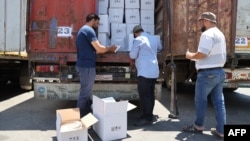A new study of United Nations contracts in Syria finds a large share of donor funds went to companies owned by individuals with troubling human rights records, highlighting the challenges of delivering needed humanitarian aid in a country dominated by what many say is a corrupt and oppressive government.
The U.N., while welcoming many of the recommendations of the report, expressed concern that “unsubstantiated generalizations” about its work might damage its reputation and undermine donor trust. It did not specify what was unsubstantiated in the report.
The report, compiled by U.K.-based non-governmental organization Syrian Legal Development Program (SLDP) and the Observatory of Political and Economic Networks (OPEN), was released this week in an event at the Washington-based Middle East Institute.
Participants in a panel that discussed the report included a former senior Syria researcher at Human Rights Watch and a senior fellow at the Center for Strategic and International Studies.
The investigators looked at the top 100 private and public-private suppliers to the U.N. in 2019 and 2020 in Syria. Using the official Syrian gazette that lists local companies and open-source intelligence, researchers found that nearly 47% of U.N. procurement funds went to “risky” or “highly risky” suppliers.
The report defines a person or entity as risky if they have been involved in conflict-related human rights abuses or have worked closely with the government of Syrian President Bashar al-Assad or the Syrian military since the war started in 2011.
The research shows that during the reviewed period, nearly 23% of U.N. donor funds, amounting to almost $68 million, went to companies owned by individuals whom the U.S., EU or the U.K. have sanctioned for human rights abuses in Syria.
Eyad Hamid of SLDP told VOA, “The procurement process goes through different stages. We were advocating for incorporating the human rights of persons in these processes all along, and this is just to provide the proof that there is a need to do that.”
UN contracts in Syria
Syria is the biggest recipient of U.N.-funded aid programs.
The report claims to cover 94% of private suppliers that won U.N. contracts in Syria. Karam Shaar of OPEN told VOA the findings present a broad picture of the problems that exist in international aid contracts there.
Among “highly risky” companies that won contracts is Desert Falcon LLC. It’s co-owned by Fadi Saqr, the commander of the Syrian National Defense Forces, who was sanctioned by the U.S. in 2020.
Another “highly risky” entity, the Syrian Olive Oil Co., won a World Food Program contract worth over $25 million, according to the report. Some of the company’s co-owners are under EU and U.K. sanctions for their support of the Assad regime in the brutal civil war.
The U.N. does not have to abide by sanctions imposed unilaterally by a country or alliance.
The Assad government is also known to artificially inflate its currency. The researchers said this enables government-linked contractors to make huge profits while a large majority of Syrians live in poverty due to the decade-long war.
“We cannot afford to lose one more dollar to the al-Assad regime, one more humanitarian dollar to be diverted,” Shaar said.
According to the report, the U.N. agencies did not reveal the name of the suppliers for over $75 million worth of procurements or 20% of the contracts given in the two-year period under review. The agencies cited security or privacy as the reason.
In a written response to VOA, the U.N. said public disclosure standards are carefully established “to maintain confidentiality on certain sensitive information and to protect the U.N. (and therefore the people we assist) from risks of politicization of data.” It said such data can be accessed if the U.N. or a member state seeks an audit.
Based on interviews with local and international staff of various U.N.-related aid agencies, the report alleges U.N. entities allowed corruption and nepotism in procurement staff and allowed the Assad regime’s supporters to be hired in local offices in a bid to maintain access to vulnerable Syrian communities.
The U.N. said its Syria team had discussed the findings with the report’s authors and had conveyed “reservations with regards to the overall characterization of the context, as well as some of the findings and recommendations.”
Report’s implications
Charles Lister, director of the Syria Program at the Washington-based Middle East Institute, told VOA the report’s findings confirm a long-held suspicion that the problems in the U.N.’s aid apparatus in Syria are not limited to a few isolated incidents but are systemic and demand change.
“I think that poses some fundamental questions about the U.N.'s either capability or willingness to do real due diligence and to ensure that it is indeed doing no harm, which is obviously a motto that it stands by,” said Lester, who is also on OPEN’s advisory council.
Conflict zones around the world pose complexities and limitations for aid agencies. Local staff can face serious consequences for highlighting issues such as corruption while foreign staff can have their visas delayed or revoked.
Access is key for the U.N. and Lister believes the agency knows that in order to operate inside Syria it requires the support of the Syrian regime.
The authors of the report said they do not want aid to Syria to stop. However, they are urging donor countries take an active role in knowing how their aid dollars are being used in Syria.
SLDP’s Hamid said he hopes that engagement with donors and civil society will “minimize, if not eliminate the humanitarian funds falling into the hands of human rights abusers in the country.”
The U.N. said its entities may have specific due diligence measures and reporting agreements with donors that help ensure maximum accountability for resources.
It acknowledged that many recommendations of the report are in line with the enhanced risk management and due diligence practices the U.N. country team has adopted since 2020.





